A Guide To Living Abroad in Bali
A
1-Way Ticket
to a Different Kind of Paradise
By Julie C. Trubkin
9/12/2016
A 1-way ticket is as romantic as it is frightening. Two years after scribbling these words in my cramped economy aisle seat, with my life's essentials in the cargo hold below, squished into a carefully packaged elaborate system of Ziplock bags, both the romance and the fear remain. Writing this sort of guide feels like a love letter to, and a break-up letter with, Bali. Part of me wants to find a way to sustain the life I've created here. Another loud part of me is ready to try somewhere new. Here is my ode to Bali.

|
|
"Oh The Places You'll Go." The old versus new. You will find street art juxtaposed with traditional art almost everywhere in Bali. |
Arrival
"Selamat malam! Nama saya Julie.” I practiced and repeated these words again and again, ready to utter them to whomever the rooming house had arranged to pick us up. But I lost my nerve almost immediately. The scene that greeted me when I arrived was a bit much for my jet-lagged, introverted senses. It took weeks to even try to utter my overly practiced phrases. Upon arrival, I scanned the sea of Batik-printed shirts. Eventually, I found my name scribbled diagonally on a placard held by a man with the most amazing two-toothed smile I have ever seen.
No matter the time of year you arrive, the moment you feel the Bali air, you smile and then quickly wonder how you will survive the heat. You will get used to it.

|
|
Rice field.
|
Setting Up When You First Arrive
Visas
Unless you’ve managed to arrange a IMTA (work permit) that permits you to stay for one year with multiple entries, you will likely have to begin your time in Bali with the automatic VOA (Visa on Arrival). The VOA is granted for free for most passports and gives you an automatic maximum 30-day stay within Indonesia. Suppose you plan to extend your visa beyond 30 days. In that case, you must look deeply into the dedicated site on the many types of visas, work permits, and long-stay permits.
Visa Extensions are an adventure in and of itself. Many people often hire an agent, doubling the cost of the whole extension process. Nevertheless, you can definitely do this on your own. It requires three separate trips to the immigration office. The first trip is to submit the application, the second is to be photographed and fingerprinted, and the third is to pick up your passport.
Social Visas are another option, most easily obtained once you've made some Indonesian connections. The social visa grants you up to six months in the country. The visa requires a sponsor and several trips to immigration. If you wish to stay long-term, you cannot effectively leave the country with a social visa since doing so renders it null and void.
All this may feel convoluted, but it is manageable with some research. People living in Bali for years often stay on with the Visa On Arrival, meaning they leave the country every 30 or 60 days on visa runs. It is a way of life. After a while, immigration may question your heavily stamped passport and your reasons for multiple visits. But, if you are honest and say that you aren't working in Indonesia, you should be OK.
|
Visa Runs: Make A Trip Of It
Treat these mandatory trips out of the country as a bonus. While they can become tedious and expensive, they are opportunities to explore surrounding countries. Most people go to Kuala Lumpur or Singapore for their visa runs because of cost and proximity. They often return the same day. With some preparation, you can find some affordable flights and accommodations. Explore. You will eventually long for a change of pace, as much as you may enjoy Bali. City life and the ease of life a city affords will rejuvenate you.
|
SIM Card — Get one. Before you leave home, make sure your phone is unlocked. I get a SIM everywhere I travel, even if it is only for a short stopover. The independence that a SIM card provides makes it worthwhile. Research your options before you arrive. You can purchase SIMs almost anywhere. They are more expensive at the airport, so try to wait. When you're in the taxi en route to your hotel, you can ask the driver to stop to buy one. They will most likely know where to stop. Phone stores abound in Bali.
Cash — I have to admit that I really want to be a jutanaire. One juta is the equivalent of one million rupiah. Rupiah denominations can be confusing. Try to understand the basic exchange rate before you arrive. I usually move the decimal four to the left for my Canadian currency, so 100,000 IDR would be $10. It is an approximation, but it's a helpful check.
Count your change — Especially when you go to a currency exchange teller. Or even to your local convenience store. I have been frequenting a Coco Mart near me for almost two years. Every time I go, every single time, they short me on my change. And every time I say something, the cashier looks at me blankly, then goes through the routine of "oh, did I? Let me look. Oh, I'm so sorry."
ATMS — Find one that gives you denominations of 100,000 IDR to save on withdrawal fees. Most will limit your withdrawal to 2 juta, but a few will provide you with 2.5 juta. As with many locales, fraud is common. Be wary. Try to use machines in more "local" areas, as tourist spots are the usual target for ID theft. Cover your PIN using your hand during entry.
Bank Accounts — Opening an account is sometimes challenging for foreigners in Bali. You can easily open an account if a local person brings you to a bank. With all that is involved in transferring funds to a local account and then considering exchange rates, it sometimes just makes sense to maintain your account in your home country. Find a bank with an account in your home country that offers decent exchange rates.
Taxis — An excellent option to learn the lay of the land in Bali, familiarize yourself with the area, and prepare yourself for your inevitable life on a scooter. They are also suitable for longer trips or if you know, you'll be out for the evening and may be drinking. Try getting the driver to use the meter, as it is often cheaper. The price drivers usually start with is typically triple or more than what you should realistically be paying. Bargain.
Transportation: Scooter Life in Bali
Riding a scooter is one of the most romantic things to do in Bali, which may sound and look crazy, but the experience is incredible. Driving through rice fields, getting caught in the rain, and holding on tight to your partner. It is even a chance to see affections usually reserved for private moments in non-scooter cultures. Love is everywhere, and witnessing families, friends, and lovers interact in these otherwise personal ways is special. Seeing a small leg poke out on the bike carrying the family in front of you is a constant and will always make you smile.
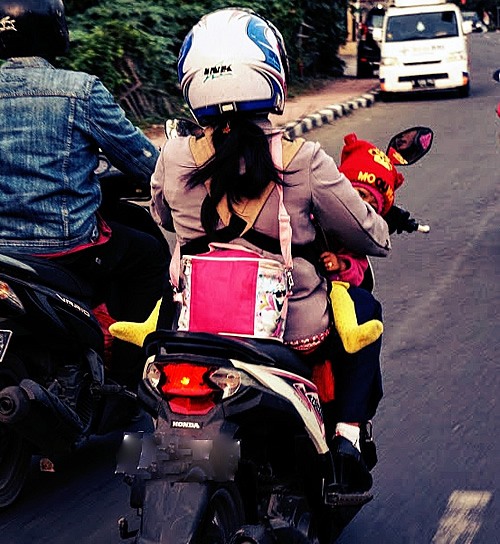
|
|
Notice the little legs poking out around the scooter driver.
|
But there are the harsh realities as well. My partner and I were determined never to drive a scooter when we arrived in Bali. It looked reckless. We rented a car, which only lasted for about a week. The traffic in Bali is exhausting and difficult to avoid if you are on four wheels. Driving a scooter is dangerous, but it can be done safely. You'll discover that what initially appears to be chaos is a beautiful rhythmic system. Learning to drive is scary. Falling is a rite of passage. Bandaged tourists abound.
|
Tips on Refueling
Fill up your scooter tank at gas stations or the local stands. Look for signs that read Petrol and the vodka bottles filled with yellow liquid. Once you notice them, you'll see them everywhere.
|
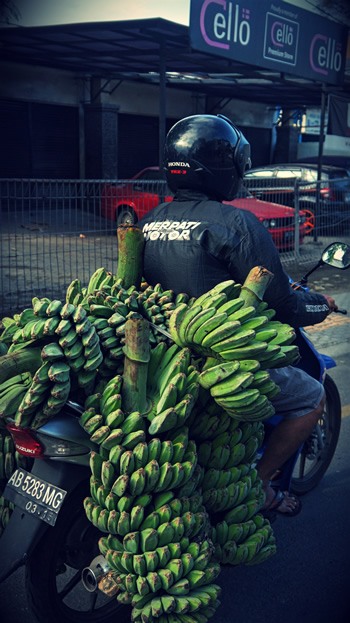
|
|
A scooter loaded with bananas.
|
|
Road Rules
-
Gangs = laneways
-
Jalans = main roads
Road Rage
Traffic is a constant, but people don't get angry, and it is rare. If you hear honking, it usually signals that a car is passing.
|
When we started out in a rented car, we were heavily reliant on Google Maps. The app directed us to a shortcut. It was night. We kept going, and the road continued to narrow. The road was only really meant for scooters. There was a period of tension under that night sky, with the rushing water on both sides of our car. We managed to reverse slowly and survived to tell the tale. We eventually tackled the same road again via scooter, a small road called Gang Mango.
We eventually tackled the same road again via scooter, a small road called Gang Mango. Down this narrow gang we went, and, almost as if in slow motion, we fell into the rice field. I jumped off the back, but my partner fell with the bike. We did manage to gather him and the bike from the wet rice field. Today, we have grown to love Gang Mango.
|
Scooter Tips in Bali
-
Always wear your helmet.
-
If the rental helmet isn’t appealing, buy your own at a local Toko Helm for a nominal amount.
-
Lock your helmet up to your bike. Otherwise, it will be stolen.
-
Get a scooter with a big trunk. To determine what constitutes big, test the size by placing your helmet within to see if it fits. Newer bikes offer more storage, which is worth the extra cost for practical and safety reasons.
-
Do not leave valuables in your bike storage. When going to the beach, try to leave your phone and cash at home. If that isn't feasible, ask a vendor to take care of your valuables in exchange for some money.
-
When driving, use closed-toe shoes to avoid injury.
|
Bike Rental versus Ownership
Monthly bike rentals are affordable, but if you know you'll be in Bali for an extended period, purchase one. You can easily sell the bike when it is no longer helpful, and it makes sense financially.
|
Bali Tool: A Second Wallet
Based on my observation, the police will likely pull you over at some point in Bali. I've been lucky and have never been pulled over in two years. I do witness it happen daily. So do carry a police wallet in Bali. Keep your money in two places, one with about 50,000 IDR, in small bills. When the officer tries to "fine" you, say that this is all you have. Even if you have your motorcycle driver's license and a local license, if you're wearing a helmet and your bike is in complete working order, they might still demand you pay a fine.
|
(Helmet) Hair
Ladies — especially for those with long hair, Bali will be a challenge. The elements, the hard water, the pollution, the ocean, the chlorine — will all be taxing on your tresses. Fortunately, treatments can be found at almost every one of the many salons. Indulge. Beauty Tip: Pack some dry shampoo before arriving in Bali. You can't find such products in Bali.
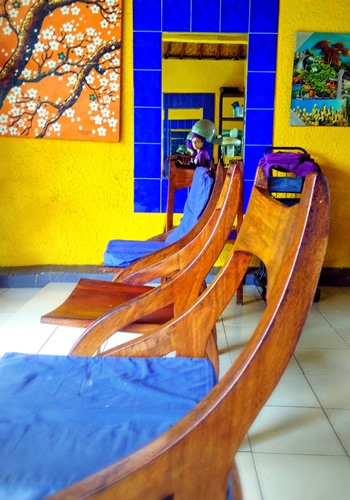
|
|
Getting a hair treatment.
|
Gentlemen — try one of the many barber shops. Wander in. Look for signs that say Potong Rambut (haircut). Bring a photo if you'd like a reference. Otherwise, they'll trim you as they see fit. They'll also give you a close shave.

|
|
Barber shop.
|
Language
“Can you take us to Can-goo? Yes, we’re staying in Can-goo.” This was how I pronounced the area when we first arrived to live. That is, until I learned that “c’s” are pronounced as “ch.” Canggu is pronounced chun-goo.
Try to sound a bit like a local. It will help you connect. Selamat Pagi! Selamat Siang! Selamat Malam! (Good Morning! Good Afternoon! Good Evening!) can be said more colloquially as Pagi, Siang, Malam." Try to drop the formality of selamat and say "morning!"
Terima Kasih Banyak, or "thank you very much," can be shortened to makasih ya (pronounced mah-kah-see yah).
Do learn your numbers. This will help you greatly when bargaining.
|
Language Tools
Online and Apps to Download
Aside from Google Translate, dedicate a few minutes every day to practice Bahasa (the official language of Indonesia). You can find apps to download to do so.
|
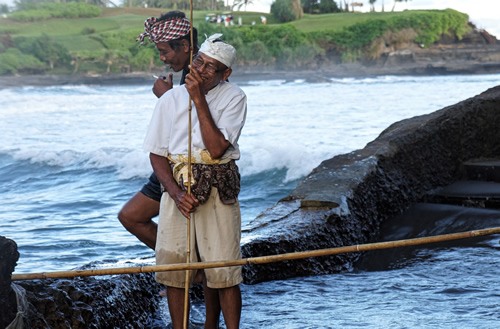
|
|
Smiles are pretty universal until you master the language.
|
Accommodations in Bali
Try to find a short-term rental initially. Short-term rentals can cost more than yearly but allow you to explore where you want to make your base. Most villa rentals require you to sign a year-long lease and pay upfront in cash. Before signing a lease, look online — many people post spare rooms for rent. This is often a much less daunting commitment if you feel somewhat transient. If you don't wish to live in a whole villa, look up kosts — 1-room "apartments" that can be hard to come by but are worth seeking.
Ultimately not everything will work out the way you expect. You’ll get used to moments of anxiety when it comes to finding your ideal place. You'll learn to laugh as we did.
|
New Bali Home Checklist
-
Visit the space at different times of the day before committing .
-
Test the water pressure.
-
Compare outdoor living vs. enclosed spaces. The romance of an outdoor kitchen fades quickly. The logistics of keeping it clean and battling mosquitoes, rodents, heat, and moisture can be complicated. Many people rent these spaces and spend most of their time in their bedrooms because much of the area becomes unusable
-
Handling repairs must be established in writing to clarify who is responsible for issues such as pool pumps, roof leaks, wells drying up, etc. Usually, landlords will repair significant problems. But some landlords avoid doing any repairs.
-
Ensure that the internet speed you need is available in your area
-
Electricity (Listrik), is it included?
-
Maintenance of the pool and cleaning, is it included? Can you hire your own staff? We found the idea of staff in general uncomfortable. People enter your home at random times, and privacy is lost. We eventually learned to maintain our pool and take care of the regular cleaning ourselves. We both work from home, and frequent interruptions are distracting and intrusive. The luxury of help from any staff assisting wore off quickly.
|
Laundry
Laundry services are everywhere. Most rental units do not come with laundry machines. You will go through many services until you find one that is satisfactory. Many will return damaged clothes, missing, overly perfumed, or even including articles that belong to someone else. Hand wash your favorites. Investing in your own laundry machine makes sense if you've found a long-term home. You can sell it when you leave.
Weather
I'm a 4-seasons person trying to adjust to a 2-season world. The windy season and rainy season punctuate life here.
Rainy Season
The rainy season can be paradoxically pleasant. Bali is lush. You get stuck in the rain a lot, which you come to enjoy.
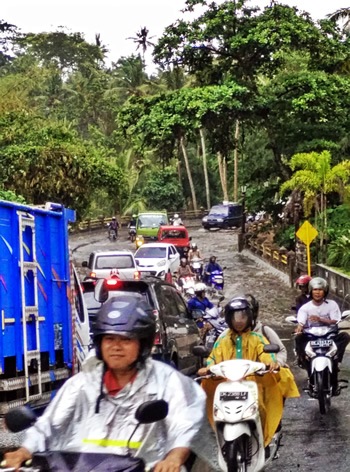
|
|
Bali is especially lush during rainy season; here traffic makes its way through the rain.
|
|
When Exploring Bali, Always Pack:
-
Mosquito repellent — you can buy this in most mini-marts. They sell perfect travel-sized spray bottles as well
-
Water shoes — take these to waterfalls. They really enhance the entire experience
-
Rain ponchos — – you can pick one of these up from almost every shop. Leave one in your scooter trunk during the wet season as you will most certainly use it.
-
Sarong — pack one when exploring holy sites. It is worn by both men and women
|
Windy Season
Windy season is kite season. Kites fly high every day, playing with the kids and the gods. Look up kite festivals. Whole villages hoist these massive kites onto the backs of trucks to pre-determined locations and battle it out. Kite flying is an authentic Balinese art learned as early as one's first steps.
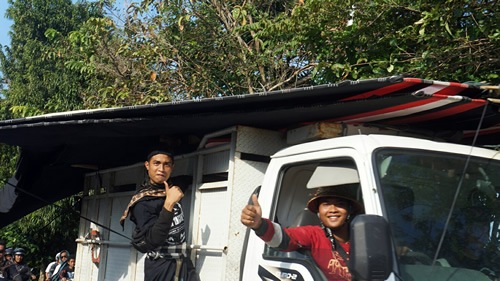
|
|
A massive kite carried on a truck during the windy season.
|

|
|
A kite festival.
|
Sunsets
Catch the sunset. Daily. Each one is entirely different. Schedule your time and find a good vantage point. The best part of the nightly show often comes after the sun sets.

|
|
A sunset in Bali.
|
Religious Rituals
Religious rituals dictates the pace of life in Bali. While the rest of Indonesia is predominately Muslim, Bali practices its own form of Hinduism. Offerings are made daily in front of entranceways, temples, and in the middle of intersections. Known as canang sari, the offerings include everything from chocolate bars to cigarettes. Incense fills the air and is an essential part of the ritual. You will inevitably trip over the offerings, but try to be as respectful as possible if you accidentally do so.

|
|
A close-up of a Canang Sari offering.
|
Ceremonies happen almost every single day. Entire roads can be closed. Women sit elegantly on the sides of bikes in kebaya, their traditional outfits. Try to be invited to a ceremony. Buy or borrow an outfit to wear.
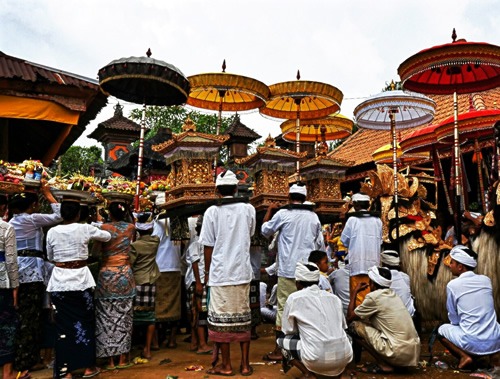
|
|
A village ceremony.
|
While predominantly Hindu, Islam is still fully present. Ramadan is a fascinating month in Bali to see the food stalls set up after sunset. And then there are the mosques. It is almost impossible to avoid hearing the sounds emanating from a mosque. Around sunset, sitting outside, listening to the call to prayer, it is hard not to sense that they are calling out to you. At 4 a.m., you will likely hear the first of the five calls to prayer on the megaphone. Combined with the sounds from Hindu temples playing their gamelans, xylophones, gongs, and drums, the interplay between sound and spirituality in Bali is fascinating.
|
The most fabulous holiday in Bali is Nyepi, the day of silence. Airports close. No one is permitted to leave their home or to use electricity. Streets are patrolled. People often leave for the day, but I urge you to stay. It is an opportunity to just be.
Try to stay in a place where you have access to a pool. Spend the night before observing the Ogoh Ogoh parades, and enjoy the day of relaxing, eating, and floating. Try to go outside at night while staying within the property's grounds. Look up at the sky. It's so easy to overlook what is far above us every night.
|

|
|
Village ceremony with women carrying offerings while dressed in colorful kebayas.
|
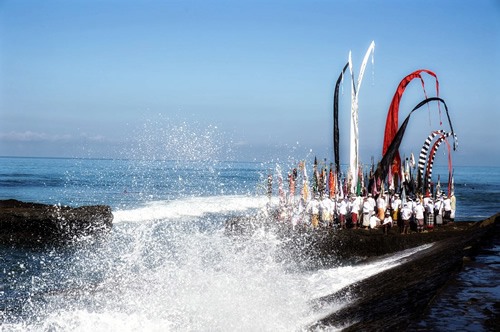
|
|
Melasti three days before the Nyepi ceremony at the oceanfront.
|
Being a Woman in Bali
IIn some places, more than others in Bali, one can't help but be hyper-aware of their gender.
-
Safety: Being a woman is basically safe here. But, like anywhere in the world, you must be cautious. When driving your scooter, especially alone and/or at night, try to cover up, keep your valuables hidden in your trunk, and don't wear headphones. Dress more conservatively when exploring areas that aren't as full of tourists.
-
Fashion: You will soon become the owner of more shorts and sunglasses than you ever imagined possible.
-
Solo Travel: Do it. It is empowering. It can initially seem daunting, but it is much more accessible than you might imagine.
Food in Bali
Do try to taste everything that you possibly can. Especially the fruit. The market sellers will often woo you by cutting a piece of fruit as a temptation. It is effective marketing. Many people eat every meal out. If you are longing for home-cooked food, groceries are easily accessible. Explore the local markets as well as the grocery stores.
|
The hard spiky fruits on the side of the road are called durian. Try them at least once. Some people despise the taste, others live for the season. They do have a potent odor. You'll often see cars with durian hanging on the outside so that the smell doesn't linger inside.
|

|
|
Satay on bamboo skewers.
|
Don't drink the tap water! Buying water or installing a filter system are the two options. We buy the big 19-liter water jugs, refill them at a store, and carry them home on our bikes.
Health
We both became quite ill early on after our arrival. I've had dengue fever and hand-foot-and-mouth disease. After some time, your body learns to adapt to the new environment. Do purchase travel health insurance before you leave home. World Nomads is a great option. Doctors are often a short drive away and make house calls for a fee. Pharmacies (Apoteks) are on almost every street.
Natural disasters are usually not covered by insurance. I learned this the hard way when several flights were canceled due to volcanic ash. My bank account is still recovering.
|
In Bali, I Struggle With:
|
-
Lugging water jugs home
-
Cash withdrawal limits at the ATM
-
Bike storage
-
The class system
-
Paying for a year’s rent upfront
-
Bugs
-
Outdoor living — kitchens & bathrooms
-
Entitled or reckless tourists
-
Laundry
-
Visa runs
-
Having staff
-
Cost of yoga classes
-
Being called a "bule" (foreigner). Even if I lived here for two decades, I'd still be a foreigner. The idea of "us" and "them" is a real struggle. The "othering" occurs on both sides here — and there are clear sides. I'm sure proficiency in the Bahasa local language would diminish this sense of being an "other," yet to be honest, it remains omnipresent. Cultural immersion is never absolute; one can try sincerely to live like a local but never really be one.
|
|
In Bali, I Love
|
-
The smiles — locals smile with their entire being
-
The frangipani — I could inhale these flowers every day of my life
-
Passion fruit — Every time I savor this fruit, I imagine what it must have been like to be the first person to discover this manna
-
Sama sama — the sing-song-y way people say "you’re welcome"
-
Bali dogs
-
Sunsets — my time is scheduled around them
-
Mango season
-
Kite season
-
How people honk
-
How everyone is so resourceful
-
The freedom — to ride, to play, to be
-
Low tide — it is otherworldly
-
Yoga — some of the studios are what dreams are made of
|
|
In Bali, I'm Homesick For
|
-
4 seasons
-
My family
-
Public transportation
-
Laundry machines — specifically a dryer
-
The arts scene that most big city offer
-
Extra firm tofu
-
Almond milk accessibility
-
My books — all currently in storage
-
Window screens
|

|
|
A farmer tending his fields.
|
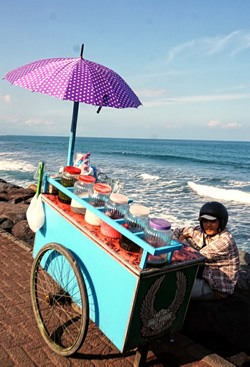
|
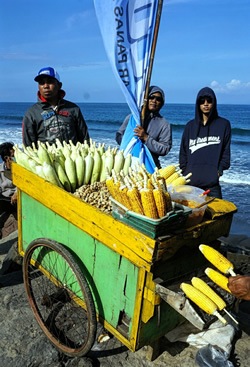
|
|
Oceanside vendor.
|
Oceanside corn vendors.
|
My partner and I moved to Bali without ever having previously visited. We knew no one. We had some savings, a suitcase each, our laptops, and each other. Bali has beat us up and has loved us so wholly. Two years and counting, and we still have one foot out and one foot here for good. A different kind of Paradise.

|
Julie C. Trubkin is a cabin-in-the-city kind of girl, currently exploring life as a Bali island girl. She graduated from the University of Toronto with a double major in English Literature and South Asian Studies. Two continents away from a complete set, she funds her constant need for travel by writing for various publications and creative non-fiction, travel writing, and creative corporate copy.
|
|
